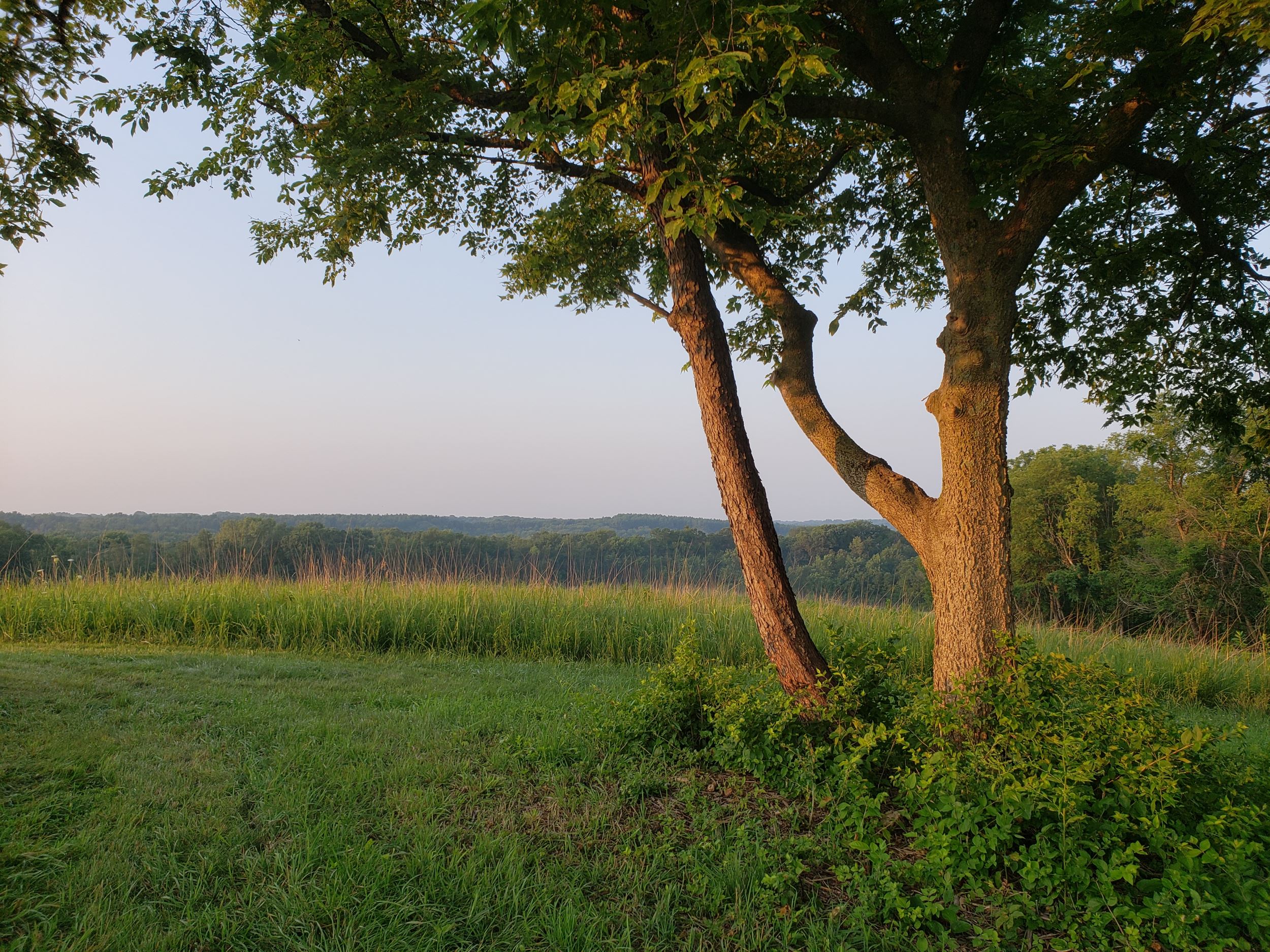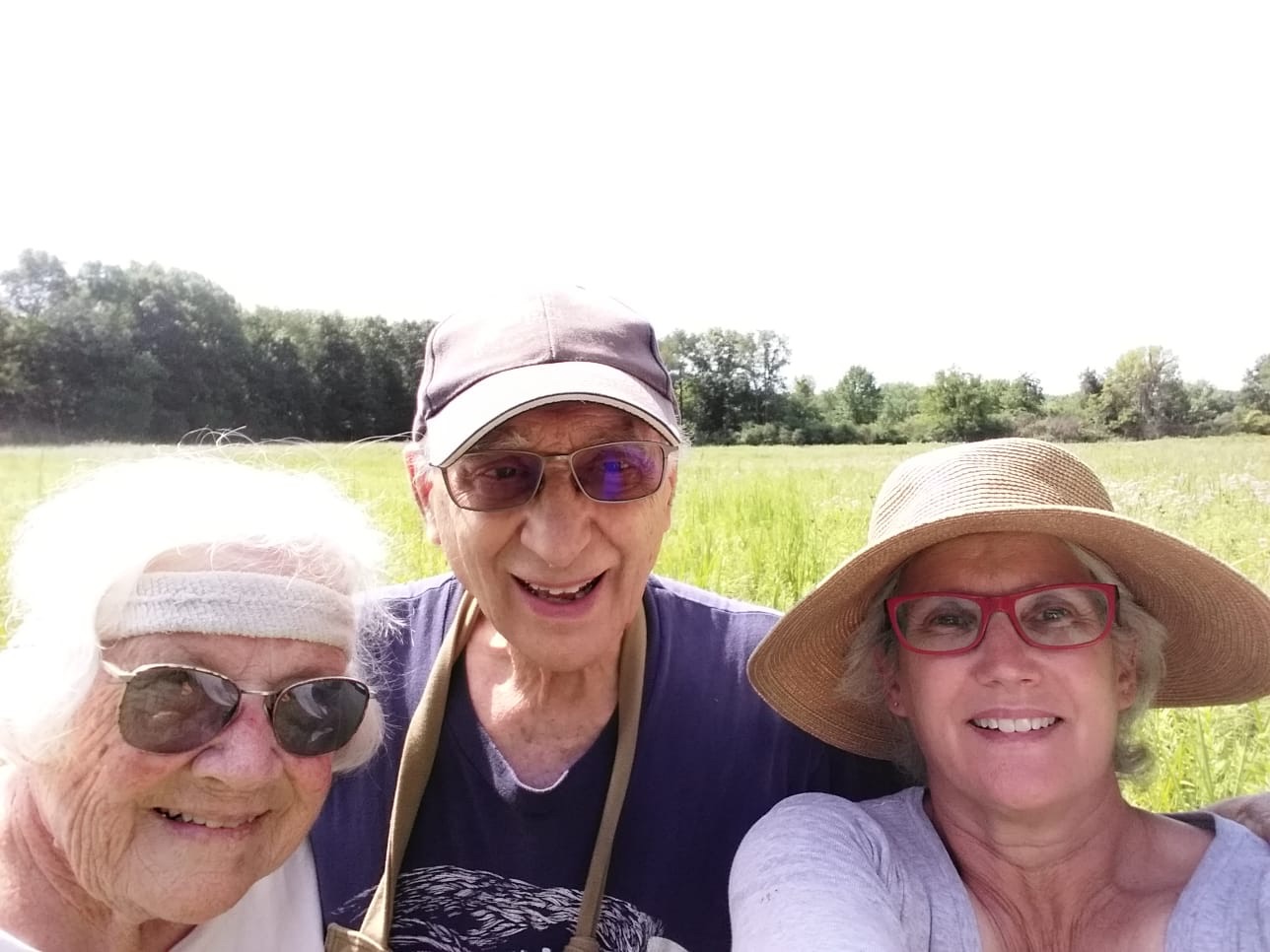Returning Home: One family's gift is creating a new public area in Johnson County and reconnecting a tribe with its ancestral land
By Bria Holthe on September 27, 2022 in Blog

Nestled within the rolling hills of Johnson County lies Two Horse Farm: the culmination of decades of love and hard work spanning generations.
In 1978, Pat and Enid Cancilla purchased 90 acres of land on a ridge overlooking the Iowa River Valley. Old farmer’s wisdom indicated it would take two horses to work a property that large. The size, coupled with an old shed found on the property with two horses carved on it, led to the name Two Horse Farm. On the property lay oak-hickory savanna and prairie ecosystems in need of restoration, a job that the Cancillas were happy to take on.
The Cancillas are conservation-minded and were awarded INHF’s Lawrence and Eula Hagie Heritage Award in 2019 because of their restoration work on Two Horse Farm. Their passion for protecting Iowa’s land was passed down to their daughter and son-in-law: Erin and Brian Melloy.
The Melloys moved onto the property in 2013 with the goal of continuing the work the Cancillas had started: removing invasive species and restoring ecosystems. Working on the land was a labor of love for the couple; they wanted the land to look and be healthy. The Melloys removed stubborn invasives like honeysuckle and oriental bittersweet to create one of the healthiest oak-hickory forests in the region and conducted regular burns and brush removal on the prairie.
started: removing invasive species and restoring ecosystems. Working on the land was a labor of love for the couple; they wanted the land to look and be healthy. The Melloys removed stubborn invasives like honeysuckle and oriental bittersweet to create one of the healthiest oak-hickory forests in the region and conducted regular burns and brush removal on the prairie.
After 10 years spent pouring every bit of love and time they had into caring for the property, it became even more important to ensure it was protected forever. Once the Melloys came to that realization, it was just a matter of who to call.
“It became a question of how do we make this happen long term and who do we need to approach,” remembered Erin. “As well as what’s their philosophy and does it mesh with ours. What’s their capability to actually maintain a large property? No matter what question we asked ourselves, Johnson County and Johnson County Conservation always came back as the answer.”
The Melloys’ relationship with Johnson County Conservation (JCC) was many years in the making at this point. Both they and the Cancillas frequently volunteered with the organization, and JCC had been working on several projects near their property. These connections grew a relationship that fostered the trust the Melloys needed to pass on ownership of the property. JCC has taken on the mantle of continuing the work the Cancillas started decades ago: managing and maintaining the land, while also aspiring to new heights.
The Melloys donated a portion of the land’s value in a sale to Iowa Natural Heritage Foundation. INHF was then able to transfer the property to local partners so the land could become available to the public.
Soaring to New Heights
The relationship with Johnson County Conservation is not the first Two Horse Farm has fostered. Erin’s sister Jodeane Cancilla is a founding member of RARE, Raptor Advocacy Rehabilitation and Education, a non-profit raptor rehabilitation and education organization. RARE has been using Two Horse Farm as a rehabilitation site for years.
After Jodeane helped create RARE, Erin and Brian were quick to suggest turning a barn on their property into a flight space for the birds. For Jodeane the opportunity was perfect. She would be able to provide birds under her care with space to thrive in a place she knew and loved. Erin and Brian helped RARE build a flight enclosure in their barn along with a caged-in outdoor space. The barn enclosure houses birds they are currently rehabilitating while the outdoor space houses their education animals.
In the future RARE hopes to host more educational events out at the property in partnership with JCC. “I’m very excited for the future and I think it’s going to be a fabulous relationship,” said Jodeane. “The transition is bittersweet because we used to hold family get togethers out there, but we’re gaining a bigger family there. I think it’s going to be a wonderful opportunity for everybody.”
JCC is very aware of how special this plot of land is. They plan to take full advantage of all the unique connections this land holds through continuing partnerships and offering new education opportunities for the public. Education, operations and maintenance staff will all be working out of the site in the future. But there’s something even more special in store for a seven-acre circle in the heart of the property.
Returning Home
“We do hope this is a gradual reconnecting for us and for the people of Iowa. It’s a continual going home for all of us in different ways so we remember that place and so people remember us.” Lance Foster, Vice Chairman and Tribal Historic Preservation Officer of the Iowa Tribe of Kansas and Nebraska
The Iowa Tribe is the tribe which Iowa is named after. There are two branches of the tribe, one reservation in Kansas and Nebraska and the other in Oklahoma. The lands of the Iowa Tribe were ceded to the U.S. in several treaties, losing the last of the Iowa land in 1838.
During meetings with JCC, a unique opportunity was brought to the Melloys’ attention. Larry Gullett, Director of Johnson County Conservation, had previously been approached by Lance Foster, Vice Chairman and Tribal Historic Preservation Officer of the Iowa Tribe of Kansas and Nebraska. During a meeting between the tribe and JCC to authorize the naming of the nearby Cangleska Wakan project, Foster mentioned that he wanted Gullett to stay on the lookout for opportunities to work with private landowners to rematriate a piece of land to the Iowa people.
“It’s symbolically very important that we have another part of the land that used to be ours,” said Foster.
Gullett knew from his conversations with the Melloys over the years that they could be just the folks the Iowa Tribe was looking for. Inspired by the Cangleska Wakan project, the Melloys were on board. “If we can all make this happen let’s do it,” said Erin.
Gullett was thrilled. He knew that not only was this a great opportunity for the Iowa Tribe to return to their ancestral home, but it was also an opportunity for Johnson County Conservation to learn from the tribe.
“The indigenous cultures have such a strong and respectful relationship with the land, and that’s something that our culture is really lacking,” said Gullett. “By promoting this project with a culture of people that honor the land and take care of it so well there can be a lot of cultural sharing and diversity that can help us all understand this place where we live so much better”.
Foster echoed that idea: “The partnership means not only connection to the place, but to the kind people who made this happen. Everything is connected and perhaps this will open a good new way for us all.”
Now, the seven acres at Two Horse Farm is a chance for the Iowa Tribe to reclaim the connection to their ancestors. “We will use the land for prayer and to remember our ancestors, and through them, our ancient connection to this place,” said Foster. “We will see the Iowa River far below, which was named for us, and which gave the state its name in turn. We may even come at times to sing our prayers for the land and all who come there.”
Stepping onto Two Horse Farm is akin to stepping onto a sanctuary. Visitors are immediately struck by the restful beauty found on the land, full of places that beckon you to sit down and soak it in. The Melloy’s decision to share this experience with the public is nothing less than a selfless gift, and the diverse opportunities for conservation and education would have never been a possibility if it wasn’t for a family of Iowans willing to spend years of their life giving back to the land.
Learn more about Two Horse Farm: